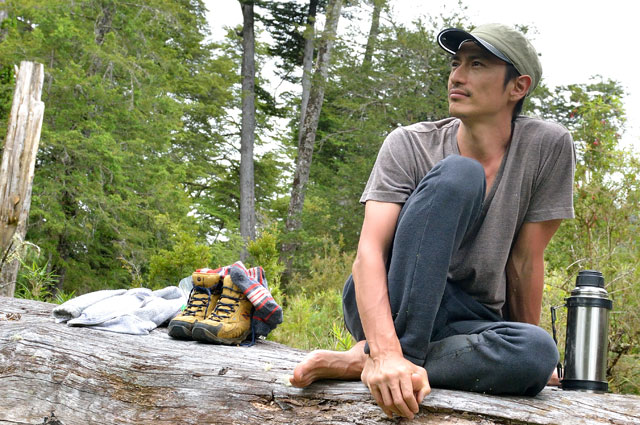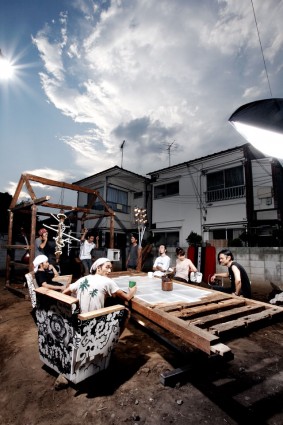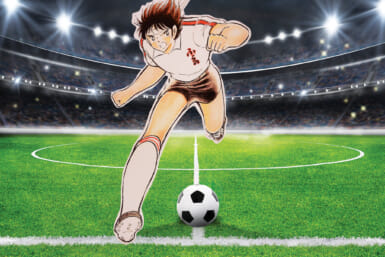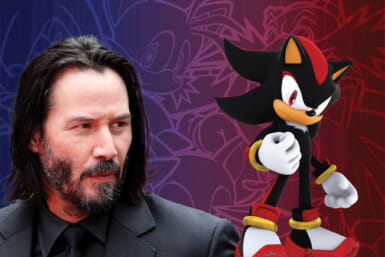Yusuke Iseya is a respected director, film star and most recently the face of quite a few advertising campaigns you’ll have seen if you’ve looked up from your seat on the Tokyo Metro lately; indeed, he is undoubtedly one of the country’s highest profile stars.
Yet after spending a short time in the company of the 34-year-old, who starred alongside Julianne Moore in Fernando Meirelles’ 2008 movie, Blindness, it soon became clear he isn’t a typical Japanese celeb. He’s a deep thinker and he has an opinion – though perhaps, to be fair to some others, what actually marks him out as unique is that he isn’t afraid to voice it, no matter how controversial.
In 2009 Iseya launched Rebirth Project, a multi-faceted business with a philosophy that focuses on sustainable development, encouraging individuals to find their own solutions to the world’s problems. We met with him at his company’s organic cafe at the Mori Trust Garden TORA4 in Kamiyacho. Eloquent, passionate and extremely candid, he spoke at great length about the project.
Main image: Photo courtesy of Suzu (Fresco)
Firstly, could you give us a little background to the Rebirth Project and why you started it?
At 27 I had achieved my professional goal to be a movie director; what I needed was a real purpose in life. I had gained a greater understanding about the planet’s most troubling issues, such as climate change, food shortages, increasing population, distribution of fossil fuels etc. I felt that for the sake of future generations it was important to try and tackle some of these problems.
That said, I didn’t just want to create a volunteer group that seemed like it was on an adventure, it had to be a registered public company, something well structured and orderly, a business that could inspire people to try something similar.
The best and easiest place to start was with food, shelter and clothing – the necessities of life. While studying at Tokyo Arts University I was surrounded by a number of creative people [Iseya is also half-brother to respected designer, Kansai Yamamoto]. They often had leftover things from their projects, and of course they were limited in terms of what they could do with it, so I started thinking about how we could use some of those resources to create some things that would be beneficial for people and the environment.
So the concept was in place, how did you execute your ideas?
One of our early enterprises was with Lee Jeans, who we approached with the idea of taking the denim that they would normally throw away and putting it to good use. Almost all clothing manufacturers have dead stock, but choose to hide that because they are they are embarrassed about it.
Using an eco-friendly printing technique, with Lee’s dead stock as our canvas, we created prints based on 80s themes and figures, such as (Margaret) Thatcher, Gorbachev’s policy of Perestroika, or rebuilding, and one of my favourite films of that era, Back to the Future. Fortunately Lee were really receptive and seemed to understand what we wanted to achieve.
You’ve launched a number of initiatives since, such as the ‘Genki Dama’ Project, what’s that?
It is based on the Genki Dama (Energy Sphere) from Dragonball. The idea is that when everyone uses a bit of energy, this can create a huge ball of fire that can overcome the bad guy. Our concept is basically the same: individuals working together to create something sustainable. Rather than just throwing money at a situation or giving food, we want to provide opportunities to individuals who don’t have the resources to execute their ideas.
It all sounds very impressive, how successful has it been?
I’m very happy with how it has been going, though there was certainly some skepticism early on. Since the 2011 earthquake more and more people, for the first time in many cases, are thinking about how much energy they are using etc and that we have to do something for future generations. It is criminal if we don’t, not literally of course, but truly evil if we don’t try and help in some way.
“At the same time as making public statements about aiming for no nuclear power plants by 2030, they then go and sell nuclear power plants to foreign investors. This goes against the ecological concerns of the electorate.”
We must also raise our voices to help change the government’s policies and try to make the planet a better place to live. If you look at the Japanese government, I think the priority is short-term economic gains over long term goals.
At the same time as making public statements about aiming for no nuclear power plants by 2030, they then go and sell nuclear power plants to foreign investors. This goes against the ecological concerns of the electorate. I think that while it is important to respect the institutions that rule us, we must constantly question them. It is up to us to shape our own future.
You’ve talked before about how in Japan people see the future as something someone else will determine. How can you change that mindset?
While we now have a greater understanding of the way the world works, the basic function of the human brain – i.e. our hardware – hasn’t changed for thousands of years. Our thinking is pretty much the same as it has always been: finding short-term solutions that will help us survive. What we need to start doing is using the knowledge we have gained – our ‘installed applications’ – to start thinking long-term.
People have a lot of great ideas about sustainable development, but they often feel there is little they can realistically do, as there is no platform to express their thoughts. That is where we come in; our project helps individuals express their ideas to the public.
I think there is a growing realization that individuals can provide solutions to their own problems. This is what we want to encourage further in our workshops, with an emphasis on dialogue, technique and developing skills.
It can clearly be beneficial having a celebrity running an organization like this, would you like to see more high profile people following your lead?
Yes, it is, but I think it is more difficult for Japanese celebrities than, say, American ones. In Hollywood, for example, the relationship between actors and their agents is almost equal. Actors pay fees to their agents, and after that have a degree of freedom.
“Many Japanese actors, particularly males, get fame from a young age because of their looks, the problem is when they reach their 40s or 50s they have no identity as everything has been done for them. With me it’s different.”
In Japan actors are fully controlled by their management agencies. These agencies feel like they are the ones who ‘created’ these stars.
Most celebrities receive salaries and so have to do what their agencies tell them, it makes it difficult for them to freely take part in charity activities like Angelina (Jolie) does in the States.
Many Japanese actors, particularly males, get fame from a young age because of their looks, the problem is when they reach their 40s or 50s they have no identity as everything has been done for them. With me it’s different because I control my own affairs.
You must be busy! Is it difficult juggling your time?
It can be, but I can’t work any other way. I have been told by a number of people that I am often too hasty. I think that all humans have some kind of malfunction in their brain; with me it is the fact that I lose concentration very quickly. I can never settle and I’m constantly looking for new challenges. This is the way I function – if I ever tried to relax for a long period I think I would go crazy!
Main image: Photo courtesy of Suzu (Fresco)










